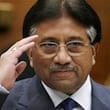There was a time when children played games with imaginary weapons that they used to win battles. In order to prolong the contests after an opponent had fallen to the ground vanquished, the fallen “soldier” after a brief interval would pop up and shout “New Man.” Apparently Pervez Musharraf wants his old chums in Pakistan to play that game with him. Unfortunately the local version of this game of good guys versus bad guys is played with real weapons, and it’s not easy to determine who is on what side.
For the past year rumors have been circulating that Musharraf, who divides his time between Dubai and London, was seriously contemplating returning to the Pakistani political fray. There has been much speculation that many former and serving military officers have wanted the former military ruler, who seized power in1999 and remained in place until a failed parliamentary election in 2008, to return to active Pakistan politics. At a press conference in Dubai two weeks ago Musharraf announced he planned to return approximately within a week after the current civilian government term is over on March 16 and a neutral interim administration takes over. Since then he has been quoted as saying March 24 is the day.
The Musharraf original announcement received surprisingly marginal coverage in Pakistan, indicating a lack of enthusiasm across the political spectrum. The explanation generally agreed upon at this time is that Musharraf’s old colleagues in the military remained hesitant regarding the former general’s return. Some analysts went so far as to suggest such an action might provoke a civilian backlash at a perceived reestablishment of military dominance or even rule over what has been for the last five years a civilian government.
Along this same line of a possible return of the military, there is a strong view that such an occasion would be better served if the current, and far less controversial, Chief of Army Staff, General Ashfaq Parvez Kayani, would lead such an effort rather than Musharraf. The former has been encouraged repeatedly over the last few turbulent years to move to assuming the presidency — either by running as a civilian this year or by direct military coup. Kayani has repeatedly and openly denied any interest outside his current top military role — the term of which also ends this year.
The entire matter of Musharraf’s return nonetheless is dogged by the fact that there are outstanding arrest warrants against him issued by the Anti-Terrorism Court and pursued by the Federal Investigation Agency (FIA) according to “relevant sections of the Anti-Terrorism Act of 1997.” The basis of the charges according to court documents is that Musharraf refused to cooperate in the investigation into the assassination of former prime minister, Benazir Bhutto. Specifically, the prosecutors have said that the former president “did not provide adequate security” for Bhutto upon her return to Pakistan from exile in 2007.
The special prosecutor for FIA has said that Musharraf would be arrested immediately upon arrival on Pakistani soil. It was his position that the formation of the interim caretaker government to administer the general election in May has no effect on the arrest warrant. Chaudhry Zulfiqar Ali, the prosecutor, has stated, however, that if Musharraf obtains “protective or transitory bail” from a High Court, he would be able to avoid arrest. It is this step that Musharraf’s representatives in Islamabad are now pursuing.
In an odd twist, the nuclear scientist, A.Q. Khan, who was exposed as selling Pakistan’s nuclear weapon secrets to Iran, among other countries, has used the issue of Musharraf’s possible return as a device to place himself in a more acceptable light. He wants Musharraf “hanged like a convict murderer.” In the highly charged political world of Pakistan, a man who made a small fortune from running a covert nuclear proliferation operation and was caught in 2004 when Musharraf was in power has assumed a public role as an arbiter of morality. A.Q. Khan recently has had most of the house arrest restrictions removed by the current civilian government and is actively returning to the public scene by focusing attention on his old nemesis, ex-president Musharraf.
As President Zardari, Benazir Bhutto’s widower, known for his own personal corruption, spends most of his time in one of his European chateaux, and General Kayani ruminates over entry into civilian life, intelligence agencies from around the world are vying with one another to figure out who the next collection of movers and shakers will be in Pakistan. It actually seems not inappropriate for Pervez Musharraf to shout, “New Man,” and jump back into the fray. The trouble with that plan — as noted earlier — is that the Pakistani political organizations prefer to play with real guns and bombs. But then the old general also knows a bit about that type of war game.
In the final analysis, the decision of if and when to return may not be up to Musharraf. His political party, the All Pakistan Muslim League (APML), must construct political alliances with other political parties. The deal-making has begun and rumors of Saudi official encouragement have been rife. It is not enough just to proclaim you are back in the game. The other players — and there are many — have to agree.
























